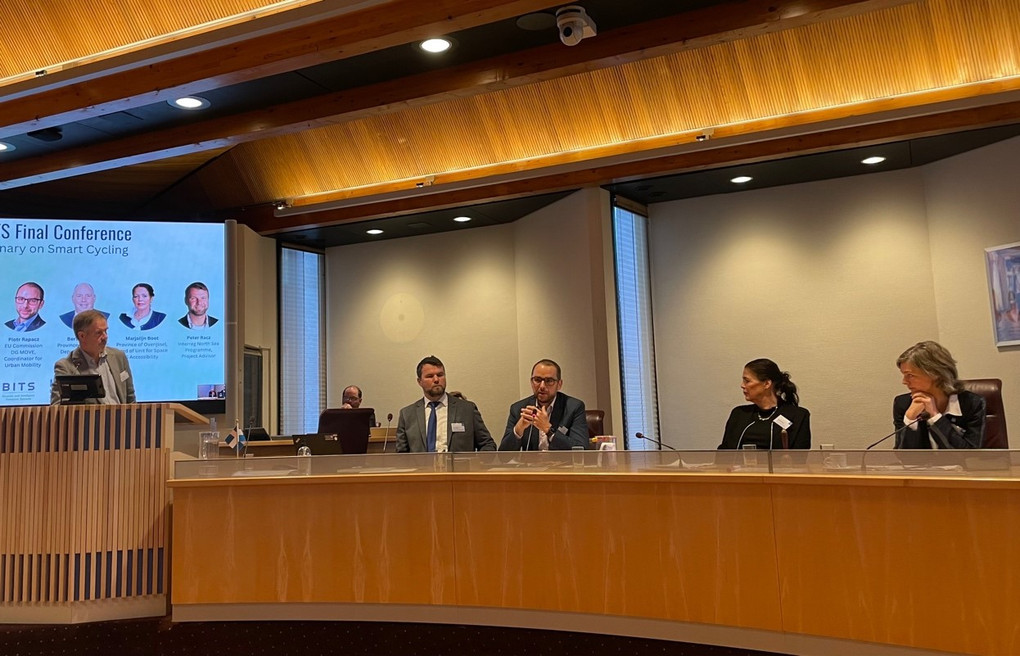BITS steams ahead with bicycle and ITS innovations
On 16th November the final conference of the Bicycles and ITS (BITS) project took place in Zwolle with around 80 attendees. The event marked the end of the first European project focused on connected cycling and ITS. The conference in Zwolle gave the opportunity to the project partners to wrap up the lessons learnt and outline the main take aways from this very innovative project.
The conference
In the stately council chamber of the town hall in Zwolle, Kevin Mayne, CEO of Cycling Industries Europe, opened the day with an introduction to the program that awaited the participants. Gerdien Rots, Alderman in Zwolle, explained how Zwolle maintains its reputation as a cycling city with the highest bicycle use in the Netherlands. Piotr Rapacz from DG MOVE gave an overview of the role of cycling in EU policies presenting the new EU Urban mobility framework and ITS legislative initiatives, while Peter Racz from Interreg North Sea Region Programme praised the successful cooperation between different realities from the North Sea Region. Marjolijn Boot from the Province of Overijssel, leading partner of the project, closed the first session wrapping up the main outcomes and deliverables of BITS.
The second half of the programme looked more closely at data as a key tool for policy making for local governments. Tina Caers and Steven Soetens from the Province of Antwerp presented the Cycle Data Hub they have developed during the project. This tool collects data links from different sources and categorizes them into six main areas: Cycle Use, Cycle Infrastructure, Safety, Health, Environment and Business.
Rick Lindeman, from Rijkswaterstaat presented the work the Netherlands have been doing to collect and improve cycling data. He focussed specifically on the need for standardisation at the EU level and the importance of ensuring harmonised reporting across Member States. This was supported by Cristina Buraga, NAPCORE Cycling Ambassador, who emphasised the EU perspective on having a common format for data gathering and analysis in cycling.
Breakout sessions followed in the afternoon, looking specifically at evaluations of the implementations and other innovative cycling projects in Zwolle and the Province of Overijssel.

From left to right: Kevin Mayne (CIE), Peter Racz (North Sea Region), Piotr Rapacz (EU DG Move), Marjolijn Boot (Province of Overijssel), Gerdien Rots (City of Zwolle)
Thirty pilot projects
With an amount of more than five million euros from the EU Interreg North Sea Region Fund, 11 partners from the Netherlands, UK, Denmark, Belgium and Germany were able to get started with ‘Smart Cycling’: from exchanging, analysing and visualising cycling data to implementing ITS solutions with the aim of stimulating bicycle use and reducing CO2 emissions. This led to thirty pilot projects which are widely shared in order to learn from each other. Part of these projects were also put in the spotlight at the BITS final conference, such as the Cycle Data Hub, e-bike hubs in Steenwijk, Bicycle Barometer in Antwerp, sniffer bikes in Zwolle, Bicycle Chain in Hengelo, priority for bicycle couriers in Zwolle with the Schwung app and the Fietsmaatjes app in Overijssel.
Connected cycling on the European agenda
Kevin Mayne, CEO of Cycling Industries Europe, said: “This project is really an example for the European Union: for the first time cities and provinces from different EU countries got together to implement innovative ITS solutions to increase cycling. This succesful story can be an inspiration for EU urban mobility policies. ‘Smart Cycling’ has the potential to facilitate the reduction of traffic congestion and improve road safety interacting with the environment around. EU actions on ITS need to be joined up with active mobility”.
Ronald Jorna, BITS project leader for the Province of Overijssel, expressed great satisfaction on the past four years: “By creating more awareness that the collection of cycling data and ITS solutions are necessary, we have been able to put it on the EU agenda. With BITS, we've added a digital layer to traditional cycling policy measures and I'm proud of that. It was much needed too. Car data have been collected and analysed for years, while bicycle data are still in its infancy. Now we are joining plenary sessions of the ITS World Congress where no cycling organisation could be found five years ago”.
Keep going
What now? “In order to further develop the impact of all these relatively small pilots a new project application has been submitted to the Interreg North Sea Region Programme under the name MegaBITS (Mobilizing Europe's Green Ambition through Bicycles and ITS). The Province of Overijssel will keep the lead and new cities will join such as Copenhagen, Hamburg and Le Havre. At the beginning of March 2023 we will hear whether we can continue. I really hope so, because there is still a lot to do in this area”, concluded Ronald Jorna.
All the presentations shared during BITS Final Conference can be found here.
Share on Linkedin Share on Facebook Share on Twitter Subscribe to our newsletter